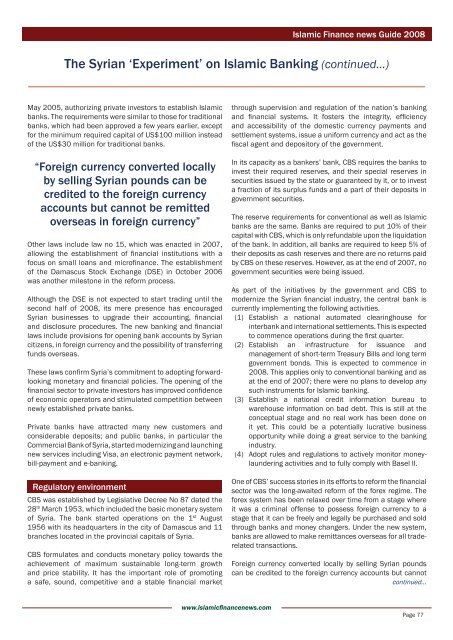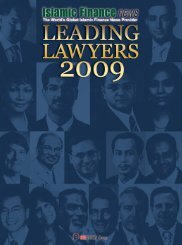Create successful ePaper yourself
Turn your PDF publications into a flip-book with our unique Google optimized e-Paper software.
www.islamicfi nancenews.com<br />
<strong>Islamic</strong> <strong>Finance</strong> news Guide 2008<br />
The Syrian ‘Experiment’ on <strong>Islamic</strong> Banking (<strong>continued</strong>...)<br />
May 2005, authorizing private investors to establish <strong>Islamic</strong><br />
banks. The requirements were similar to those for traditional<br />
banks, which had been approved a few years earlier, except<br />
for the minimum required capital of US$100 million instead<br />
of the US$30 million for traditional banks.<br />
“Foreign currency converted locally<br />
by selling Syrian pounds can be<br />
credited to the foreign currency<br />
accounts but cannot be remitted<br />
overseas in foreign currency”<br />
Other laws include law no 15, which was enacted in 2007,<br />
allowing the establishment of fi nancial institutions with a<br />
focus on small loans and microfi nance. The establishment<br />
of the Damascus Stock Exchange (DSE) in October 2006<br />
was another milestone in the reform process.<br />
Although the DSE is not expected to start trading until the<br />
second half of 2008, its mere presence has encouraged<br />
Syrian businesses to upgrade their accounting, fi nancial<br />
and disclosure procedures. The new banking and fi nancial<br />
laws include provisions for opening bank accounts by Syrian<br />
citizens, in foreign currency and the possibility of transferring<br />
funds overseas.<br />
These laws confi rm Syria’s commitment to adopting forwardlooking<br />
monetary and fi nancial policies. The opening of the<br />
fi nancial sector to private investors has improved confi dence<br />
of economic operators and stimulated competition between<br />
newly established private banks.<br />
Private banks have attracted many new customers and<br />
considerable deposits; and public banks, in particular the<br />
Commercial Bank of Syria, started modernizing and launching<br />
new services including Visa, an electronic payment network,<br />
bill-payment and e-banking.<br />
Regulatory environment<br />
CBS was established by Legislative Decree No 87 dated the<br />
28th March 1953, which included the basic monetary system<br />
of Syria. The bank started operations on the 1st August<br />
1956 with its headquarters in the city of Damascus and 11<br />
branches located in the provincial capitals of Syria.<br />
CBS formulates and conducts monetary policy towards the<br />
achievement of maximum sustainable long-term growth<br />
and price stability. It has the important role of promoting<br />
a safe, sound, competitive and a stable fi nancial market<br />
through supervision and regulation of the nation’s banking<br />
and fi nancial systems. It fosters the integrity, effi ciency<br />
and accessibility of the domestic currency payments and<br />
settlement systems, issue a uniform currency and act as the<br />
fi scal agent and depository of the government.<br />
In its capacity as a bankers’ bank, CBS requires the banks to<br />
invest their required reserves, and their special reserves in<br />
securities issued by the state or guaranteed by it, or to invest<br />
a fraction of its surplus funds and a part of their deposits in<br />
government securities.<br />
The reserve requirements for conventional as well as <strong>Islamic</strong><br />
banks are the same. Banks are required to put 10% of their<br />
capital with CBS, which is only refundable upon the liquidation<br />
of the bank. In addition, all banks are required to keep 5% of<br />
their deposits as cash reserves and there are no returns paid<br />
by CBS on these reserves. However, as at the end of 2007, no<br />
government securities were being issued.<br />
As part of the initiatives by the government and CBS to<br />
modernize the Syrian fi nancial industry, the central bank is<br />
currently implementing the following activities.<br />
(1) Establish a national automated clearinghouse for<br />
interbank and international settlements. This is expected<br />
to commence operations during the fi rst quarter.<br />
(2) Establish an infrastructure for issuance and<br />
management of short-term Treasury Bills and long term<br />
government bonds. This is expected to commence in<br />
2008. This applies only to conventional banking and as<br />
at the end of 2007; there were no plans to develop any<br />
such instruments for <strong>Islamic</strong> banking.<br />
(3) Establish a national credit information bureau to<br />
warehouse information on bad debt. This is still at the<br />
conceptual stage and no real work has been done on<br />
it yet. This could be a potentially lucrative business<br />
opportunity while doing a great service to the banking<br />
industry.<br />
(4) Adopt rules and regulations to actively monitor moneylaundering<br />
activities and to fully comply with Basel II.<br />
One of CBS’ success stories in its efforts to reform the fi nancial<br />
sector was the long-awaited reform of the forex regime. The<br />
forex system has been relaxed over time from a stage where<br />
it was a criminal offense to possess foreign currency to a<br />
stage that it can be freely and legally be purchased and sold<br />
through banks and money changers. Under the new system,<br />
banks are allowed to make remittances overseas for all traderelated<br />
transactions.<br />
Foreign currency converted locally by selling Syrian pounds<br />
can be credited to the foreign currency accounts but cannot<br />
<strong>continued</strong>...<br />
Page 77

















